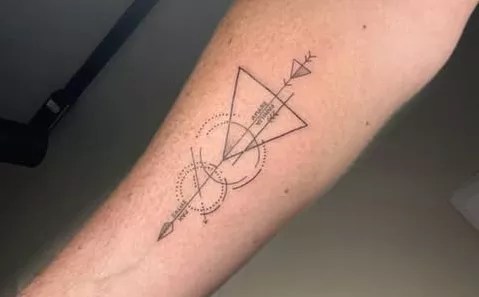
Alvin Liam Archibald photo

Audio By Carbonatix
If you find tattoos alluring but struggle with the idea of making a lifetime commitment to a piece of body art, a tattoo designed to fade might sound like a happy medium.
No, these aren’t temporary tattoos from goodie bags at your childhood birthday parties. Instead, these are Ephemeral Tattoos – semi-permanent ink applied with standard tattoo machines. The technology became widely available in 2021, after years of research and testing revealed a formula that is easier for the body to break down than regular ink.
Ephemeral Tattoo ink uses “bioabsorbable polymers” similar to medical sutures that dissolve in the skin. Traditional tattoo ink uses hard metals and other chemicals designed for the body not to process them. Following an approval process, artists worldwide can tattoo with the made-to-fade ink, and tattoo artists such as Miami’s Alvin Liam Archibald work with both.
“I love working with detail, softness, and intention,” Archibald tells New Times. “The kind of work that whispers rather than shouts, yet still stays with you. Ephemeral Tattoos are an entirely new chapter in tattoo culture…I’m deeply drawn to them because I often work with first-timers, or with people who’ve spent years dreaming of a tattoo but hesitating due to religious, cultural, or professional limitations.”
Focusing mainly on minimalist, fine-line designs, Ephemeral Tattoos combine artist technique with vegan, biodegradable ink to create a design meant to fade within three years. According to the company’s website, healing time varies based on needle depth, body type, and aftercare, with “eight percent of clients seeing results within one year, 76 percent within two years, and 98 percent within three years.” The company, which was founded in 2014, says it provides an opportunity for self-expression for people with religious constraints, and that it provides cancer patients with a less permanent mark to track radiation treatment.
Buzz, Then Discourse
A year after Ephemeral ink became available, the media frenzy that surrounded it included endorsements from Paper and Allure, among other publications. Hundreds of social media videos also touted customers’ Ephemeral journeys.
The company opened several shops across the U.S. dedicated to semi-permanent tattoos, including a shop in Little River, which won New Times‘ Reader’s Choice for Best Tattoo Shop in 2023. It closed unexpectedly later that year, along with the rest of the company’s physical locations. After several months of silence, Ephemeral offered redesigned ink via partner tattoo artists in 2024.
The internet fodder died down and was replaced with progress videos showing tattoos that had not faded within the expected time frame of nine to 15 months. While clients did begin to see their tattoos disappear, criticism mounted. Because of the different composition of Ephemeral ink, the tattoos cannot be removed via laser removal treatment. The company’s “Regret Nothing” guarantee, which refunded customers whose body art did not fade within the previously predicted window, was no longer visible on their website or social media accounts.
Dissatisfied clients have chronicled their ironic “made to fade” journeys online. On the Ephemeral Tattoos subreddit, numerous users lament their poorly faded tattoos (with photos) and their unanswered emails to the company. Unhappy clients have also flocked to TikTok, filming fading “progress” videos and Ephemeral Tattoo cover-up content highlighting how burdensome the semi-permanent tattoos can become.
Celebrities offered more case studies: Nickelodeon child star Victoria Justice got an Ephemeral Tattoo, which has yet to fade two years later, as evidenced by her recent cover shoots and Instagram posts. In contrast, Bachelor star Matt James received an Ephemeral Tattoo for the 2024 Paris Summer Olympics that appears to have faded.
The Debate Rages On
Archibald says that, in his experience, tattoos fade “gracefully” within three years.
“There’s no absolute [timeline] because every skin is different, and so is every lifestyle. The design itself – whether it’s fine or dense, large or small – plus the tattoo placement, needle technique, aftercare, and personal habits like sun exposure or skin type, all influence fading,” he explains.
While the dissatisfaction can be jarring for some, the tattoo artist takes it in stride. Fadeability does have its roots in the technical skills of the artists themselves, and Archibald says he has not had an issue with his designs disappearing as promised.
Asked if he’s familiar with the online discourse surrounding semi-permanent ink, he is diplomatic: “Of course – but that’s part of any shift in tradition,” he says. “The tattoo world, like any creative industry, has its purists. Some criticize what they don’t fully understand, and often that criticism comes from a place of ego or fear of change. I don’t really let those voices affect me.”
The online debate seems poised to continue. Just this week, Ephemeral Tattoos announced the latest iteration of its made-to-fade ink. Developed last year, the company claims its Gen 3 Ink improves upon the previous formulas, allowing for crisper linework and more intricate designs. Ephemeral says the upgraded product allows for 90 percent of its made-to-fade tattoos to fade within two years, with 98 percent fading within three years. The company emphasizes that tattoos made with their older ink formulas don’t employ the current capabilities of the made-to-fade ink.
Whether you’re a believer or not, Archibald says inking his customers – albeit semi-permanently – is incredibly compelling. “I stay focused on the connection I build with my clients – on the moment we create something meaningful for them, even if it’s temporary,” he says. “That shared experience, their joy, their tears – that’s real. Everything else is just noise.”